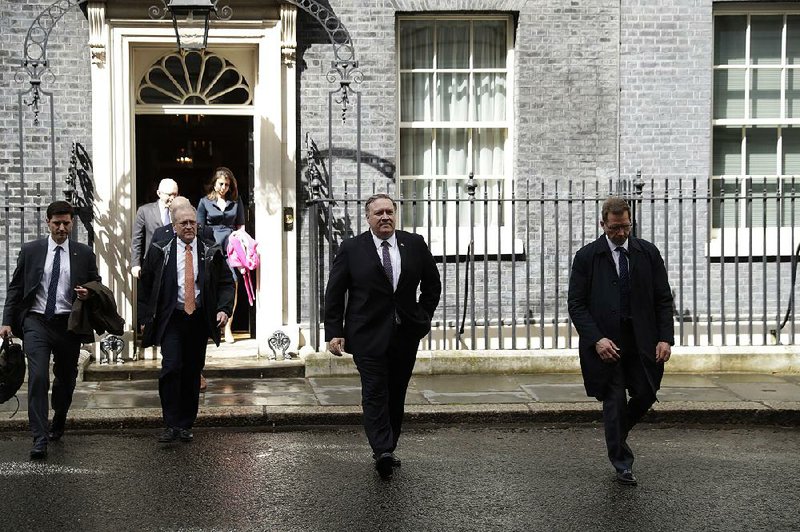LONDON -- U.S. Secretary of State Mike Pompeo urged Britain and America on Wednesday not to waver in their friendship as the two nations confront a series of global and trans-Atlantic challenges that have exposed some cracks in their historically close ties.
"It is now exactly the opposite of the time for either of us to go wobbly," Pompeo said in a speech extolling the virtues of the "special relationship" between the United States and the U.K. "Let's stand together to address the challenges of our time."
Pompeo had earlier dismissed as unfounded the idea that British-U.S. ties were on the decline.
"The special relationship doesn't simply endure, it's thriving, despite what you might read in the papers," he told reporters at a news conference after talks with British Prime Minister Theresa May and Foreign Secretary Jeremy Hunt.
He noted the two nations' strong defense and intelligence cooperation dating back more than a century, and common values that will be at the forefront of President Donald Trump's state visit to Britain in June.
But in those same comments and in his speech to the Center for Policy Studies, a conservative British think tank, Pompeo touched on differences that have caused irritation in both Washington and London.
Among those are Britain's potential use, despite dire U.S. warnings, of advanced Chinese telecommunications technology and its reluctance to repatriate British foreign fighters captured in Syria and Iraq fighting for the Islamic State.
Britain continues to contemplate using 5G technology from China's telecoms giants Huawei and ZTE despite the U.S. saying that it would threaten personal and commercial privacy and could compromise allied intelligence efforts. Pompeo and other officials have said the U.S. may suspend intelligence sharing or remove American equipment and personnel from places where Chinese 5G is deployed.
"I know it's a sensitive topic, but we have to talk about sensitive things, as friends," Pompeo said of the Huawei issue, which led to May's firing her defense minister last week. "As a matter of Chinese law, the Chinese government can rightfully demand access to data flowing through Huawei and ZTE systems."
"Why would anyone grant such power to a regime that has already grossly violated cyberspace? What can Her Majesty's Government do to make sure sensitive technologies don't become open doors for Beijing's spymasters?"
As Pompeo spoke, Robert Strayer, the top U.S. cybersecurity diplomat, told reporters there would likely be consequences if Britain lets Huawei into its 5G network.
"We have very closely integrated information-sharing relationships with the U.K. and a range of other countries around the world," he said. "In all those relationships, we rely on trust and protection of information. We would, if a country had Huawei in its 5G network, have to reassess how we are sharing information with those countries to ensure we are protecting the information that we are sharing."
On foreign fighters, Pompeo repeated that the U.S. expects countries to accept their citizens captured on Middle East battlefields.
"We have an expectation that every nation will work to take back their foreign fighters and continue to hold those foreign fighters," he said. "We've rounded them up, they are now detained and they need to be continued to be detained so they cannot present additional risk to anyone."
Pompeo also appeared to express frustration with the delays over Britain's departure from the European Union. He noted that Trump was eager to start negotiating on a free-trade pact with Britain once Brexit is complete.
"We've filed all the papers we can at this point. We're ready to go," he said. "But we can't make progress on a new agreement until Brexit gets resolved. How it turns out is your sovereign choice, and whatever happens, we will honor your choice. Our relationship was strong before Brexit, and it will be strong after it."
"Ultimately, when all is settled, you'll be first in line for a new trade deal, not at the end of the queue," he added.
Information for this article was contributed by Kelvin Chan of The Associated Press.
A Section on 05/09/2019
